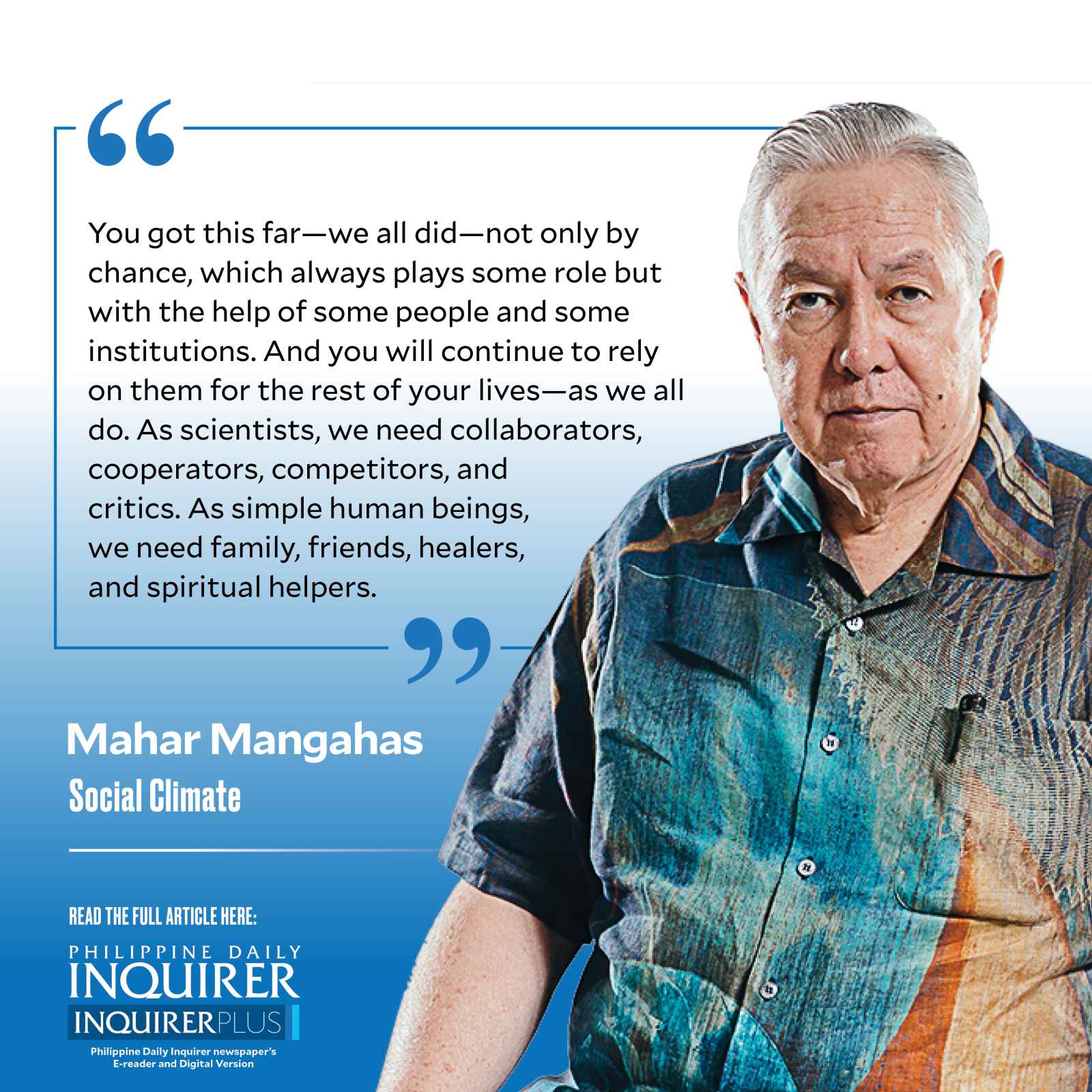Scientists don’t fly solo

The National Academy of Science and Technology held a Future Science Leaders’ Forum this week (11/9-10/23). The forum aimed to prepare the next generation of science leaders for the challenges of research and innovation, and promote their networking with peers and potential mentors and advisers. This piece is the gist of my talk on “Science and Society” at its final plenary session.]
Dear Young Scientists:
Since all of you, I am told, have a doctorate, and are below age 40, I assume you could read by age 5 thanks to your family and other social circumstances. You never suffered from “learning poverty”—inability to read simple text by age 10—which afflicts nine out of 10 Filipinos. Perhaps some of you were tutors of the learning-poor.
Article continues after this advertisementYou got this far—we all did—not only by chance, which always plays some role but with the help of some people and some institutions. And you will continue to rely on them for the rest of your lives—as we all do. As scientists, we need collaborators, cooperators, competitors, and critics. As simple human beings, we need family, friends, healers, and spiritual helpers. We all deserve to be appreciated, and joyful, once in a while.
In my own case, I was fortunate to have a parent on the faculty of the University of the Philippines and thereby was entitled to free tuition at UP. But in 1949, UP Diliman did not yet have an elementary school; luckily my family could afford a good private school. Then I did my bachelor’s and master’s degrees at UP.
In 1962, with grades short of Latin honors—too much time at billiards—I nonetheless got a job as research assistant, and then assistant instructor, and then instructor. When left alone in research (thank you, Agustin Kintanar), I resorted to oido (which José “Pepe” Encarnación called “ingenious”). For my master’s, Pepe let me take statistics, and even substitute it for economics. At that time, UP had Rockefeller Foundation funds for faculty to get doctorates abroad. I got a scholarship provided I took agricultural economics, a “missing field” in UP. To quiet my protest that I only knew how to water plants, I got sent to the International Rice Research Institute (IRRI) and did my master’s thesis there. The IRRI economist, Vernon Ruttan, got me into his alma mater, the University of Chicago.
Article continues after this advertisementMilton Friedman was very kind; he would do a lecture twice, differently the second time, if one didn’t understand it the first time. George Stigler was very funny; he taught about variance by comparing Wilt Chamberlain of basketball, at 7-foot-1, with Friedman (at 5-foot-3 per Wikipedia, but really five feet I think).
Scientists need students as much as students need them. Graduate students are the frontliners of research. In moving to the Development Academy of the Philippines after 19 years with UP—in order to do primary data gathering instead of so much classroom work—I anticipated, and accepted, the disadvantage of missing the new talent constantly entering UP. Finding former students doing well is assurance that one’s teaching wasn’t bad.
Be an effective communicator. Who is the most-read Filipino social scientist? I say it continues to be Jose Rizal, whose many writings, and own story, continue to teach about our social conditions.
To learn about overseas Filipino workers, watch or read the plays of Bienvenido “Boy” Noriega Jr. (1952-1994), like “Bayan Bayanan: Texts from Home,” which later became a musical. One of my students in UP, who then joined the National Economic and Development Authority and the Philippine National Bank, Boy did courses in theater along with economics, when sponsored for study abroad by Gerardo P. Sicat of Neda.
Try to use humor. Who can make a Filipino counterpart of “The Big Bang Theory” television series? We need more Cabinet members like Health Secretary Juan M. Flavier (1935-2014) because lack of restraint over population growth still is one of our biggest economic problems.
Offer help to others. Social Weather Stations (SWS) has a huge and ever-growing archive of raw survey data open to research. Let’s work together to get this data into textbooks at the elementary and high school levels.
Be a joiner. At its 2023 annual conference held this week, the Philippine Economic Society inducted new members of the Young Economists Honor Society. Pick and choose the associations most relevant to you; don’t be shy. SWS was an early joiner of the International Social Survey Programme, the World Association for Public Opinion Research, and the International Society for Quality of Life Studies. Learn how to stand tall in the research world.
Finally, we in the social sciences need the public in general to tell us about themselves. Fortunately, most Filipinos are willing, even eager, to do this, feeling lucky to have been randomly selected as survey respondents.
—————–
Contact: mahar.mangahas@sws.org.ph.
















